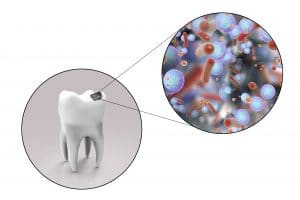
Nearly all of us will deal with a dental cavity at some point in our lives. But what causes tooth decay to form? By understanding how decay develops, you can take steps to safeguard your smile and prevent dental cavities. Let’s look at how dental cavities form!
Try Our Quiz on Cavities and Treatment Options
- True or False: Our enamel protects the teeth.
- True or False: Poor oral hygiene can lead to decay.
- True or False: Sugary foods and drinks are connected to cavities.
- True or False: We can fix a tooth in one visit.
Answer Key
- True. Our teeth consist of different layers. There is the pulp, the tooth’s nerve center, which is surrounded by dentin. The dentin makes up the majority of the tooth structure. The enamel is a very thin, but very strong, outer layer that protects against damage and harmful bacteria.
- True. A cavity occurs when the outer enamel is damaged, which allows bacteria to reach the dentin and cause a cavity. The enamel may weaken due to poor oral hygiene, which allows plaque buildup, a bacterial byproduct, to form on the outside of the tooth. Over time, the plaque and tartar (calcified plaque) can erode the enamel.
- True. When we consume foods and drinks high in sugar and other starches, bacteria break down the particles left behind on or between the teeth. This process is what leads to plaque buildup, along with an increase in oral acidity, and makes the onset of tooth decay more likely.
- True. Should you begin experiencing tooth sensitivity or toothaches, or if we find the presence of decay, then you may need treatment. We can often address a cavity in one visit using a lifelike composite resin dental filling. We can also create custom-made dental crowns as well.
Do You Have a Toothache?
At Jeffrey Leibowitz, DDS, we can address aching teeth and cavities with our restorations. We’ve proudly served our patients in Astoria, NY (including Queens, Manhattan, Brooklyn, and all surrounding communities) since 1991. To schedule an appointment with Dr. Leibowitz, call our office in Astoria today at 718-728-8320.


